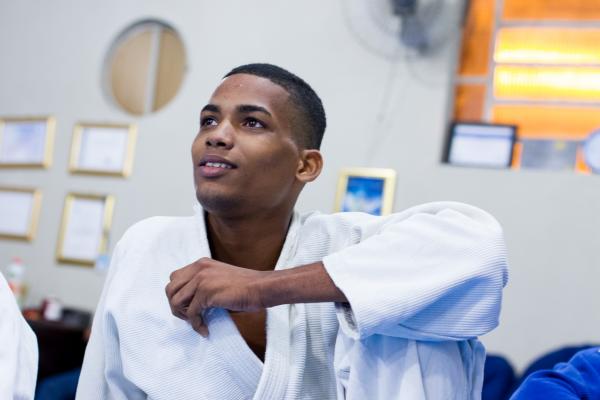Thirty-four young people, ages 16 to 21, sit in a large circle on the mat where they train each week. Timid at first, they begin to open up, little by little, about life before Força Jovem Judo.
Lucas Ferreira, who lives in Morro da Mangueira, a slum in Rio de Janeiro, speaks first.
“Before I began practicing judo, I was an eight-year-old roaming the streets and keeping bad company,” says Ferreira, who is now 20 and married.Renan Alves, a 19-year-old living in Morro da Mangueira, an impoverished area of Rio de Janeiro, credits the Força Jovem Judo team with turning his life around. He now teaches at a day care sponsored by the Rotary Club of Rio de Janeiro-Mercado São Sebastião. Vitor Vogel
With a half-smile, 19-year-old Renan Alves, who has been taking judo since he was 10, begins speaking rapidly: “I was a kid who had terrible thoughts like I’ll be a bad guy, a drug dealer.
“Finding Força Jovem Judo opened doors for me. It showed me I could be a good citizen and compete for my country,” says Alves, who teaches at a day care center in the favela where he and Ferreira live.
Ferreira and Alves are among 300 students from the surrounding slums who train weekly with the Força Jovem Judo team, supported by the Rotary Club of Rio de Janeiro-Mercado São Sebastião, Rio de Janeiro.

Coach João Luiz Miranda, a member of the Rotary Club of Rio de Janeiro-Rio Comprido, along with his assistants, have worked hard to form a cohesive team. In the process, they’ve shown these young people a life beyond the violence and crime they witness daily in the favelas.
Before becoming their coach, Miranda was a police officer in Rio de Janeiro. In 1998, he took part in a program to get children and teens off the streets. But he was frustrated. “They ended up going back to the same situation. The program didn’t seem to be helping,” recalls Miranda.
The next year, he asked his supervisor if he could establish a sports program at police headquarters. His initiative, which began with just three students, grew quickly. Today, the team trains at the Clube de Regatas Vasco da Gama soccer club facility. Younger team members, ages 3 to 13, practice at a nearby church.
Olympic hopefuls
Vitória Pinheiro trains daily with the team for a chance to compete in the 2020 Olympics. She credits Força Jovem Judo with helping her focus her negative energy toward a positive goal. In addition to the judo team, she’s also a member of the Interact Club of Força Jovem Judo-CFC, sponsored by the Rio de Janeiro-Mercado São Sebastião Rotary club.
Miranda says the 2016 Olympic gold medal win in women’s judo by Brazil’s Rafaela Silva, who grew up in Rio’s notorious City of God favela, has shown his team that anything is possible. “It’s very rewarding to see these young people from the favelas becoming state — and world — champions,” he says.
The Força Jovem Judo team has won the state championship twice and was the reigning champion in 2016. The team has also won a world championship, and in 2015, five athletes competed at the Brazilian Championship in Brasilia, where they won gold, silver, and bronze medals.
‘Kids were almost fainting from hunger’
Miranda, who volunteers as coach since retiring from the police force, concedes that his team wasn’t always as successful as it is now.
“Up until six years ago, the best we had achieved was 15th place,” he says. “The athletes were good. The trainers were good. But the kids were almost fainting from hunger.”
Their performance changed radically with the involvement of the Rotary Club of Rio de Janeiro-Mercado São Sebastião and 2015-16 Club President Décio Luís Escudero Garcia. Through a partnership with local food banks, the club provides boxes of food to the team and their families each month.
Working with 17 Rotary clubs in District 4570 in Brazil, the club has also purchased judo uniforms, paid registration fees for competitions, and donated weight training equipment. They coordinate their fundraising efforts through GRAAMO (Rotary Support Group for Olympic Martial Arts) and raise additional money by selling used cooking oil from nearby restaurants to a recycling plant. A French company, INEO (Engie) do Brasil Engenharia e Sistemas, is also a major supporter of the team.
Championing a new life
Not everyone on the team wants to be a professional athlete. Some are considering careers in journalism or marine biology. “Professor” João Miranda, as the students call him, offers guidance for all their aspirations.
“The main goal of the program is to improve the communities, one person at a time,” he says. “All of the students live in shantytowns. Our goal has always been to involve them in something good, to show them options beyond a life of crime.”
Participation in the judo program is free. To remain in the program, students must attend school, get good grades, and treat their family, friends, schoolmates, and team members with respect.

Leave A Comment
You must be logged in to post a comment.